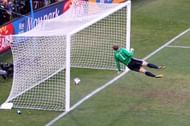Here is the second part of our special series – The Bigger Picture, and today’s focus will be on technology in the sport. We analysed the decline in the standard of refereeing last time out and today we will discuss whether technology will not only improve officiating, but the game as a whole.
Football has always been known for its traditions. It has been known for its equality around the world and its harmony at the largest stage, all the way down to kids playing in a park. The implementation of technology would break this mould, destroy these bonds, but something must be done.
Football is fast becoming a backward sport. A sport which lives in the past, sort of like a caveman compared to its fellow sports. Cricket now has a wealth of technology at its disposal. As do Tennis, Rugby and American Football. All have changed for the better. It is time for football to make that change.
Introduction of goal-line technology the first step
As we all know, football took a large step last season by introducing goal-line technology into the Premier League. This was the first time in the sport’s history where technology could have an immediate effect on the outcome of a match and there were worries that this technology would fail to work when most needed, but it has worked superbly.
No longer do officials have to make split second decisions on whether the ball crossed the line or not. No longer is a team’s entire season balanced on whether the right call is made or not.
Goal-line technology has ended the ‘ghost goal’ controversy we once saw, most notably in the UEFA Champions League semi-final between Liverpool and Chelsea where Luis Garcia’s supposed goal was enough to send the Reds to the final or in the World Cup quarter-final where England’s Frank Lampard had a vital goal disallowed against Germany despite the ball clearly crossing the line.
The role of the fourth official
There is no doubt that goal-line technology has worked wonders for the game, but why isn’t more technology implemented? Doubts over whether a ball has crossed the line or not is only a tiny segment among all the controversial decisions made throughout a game – a rare occurrence. So why isn’t anything being done to help solve more frequent issues in a match? What forms of technology can be implemented to help change football for the better?
One of the biggest wonders in the world of football is what the fourth official is actually supposed to do throughout a game? Hold up the board indicating substitutes and added time, break up heated exchanges between managers and replace the referee in case of an injury… is that it?
The role of the fourth official could be pivotal to any potential technology being implemented. If you gave them access to a TV monitor on the side-line (as seen in the NFL) they could make quick, real time decisions on calls that the referee cannot make with certainty.
Simulation, hand ball, off-sides and violent conduct are all regular occurrences leading to bad refereeing decisions. Why not let the fourth official quickly take a look on a monitor and make sure the right call is made? The game doesn’t have to stop. The play could be brought back to the incident and the right decision could be made, thus punishing the offender.
Currently, it seems as if the main talking point after a match in the Premier League is a decision made by the referee and not the game itself. With this technology implemented, it would stop any conflict or confusion. There’s no guarantee that the right decision will always be made, but it would certainly reduce the amount of bad ones called.
Unfortunately in football, many decisions come down to a matter of opinion. For example, handball is often disputed amongst pundits and fans alike. Did the player have time to move his hand? Was it deliberate? This all comes down to opinion, but it would certainly be less controversial if an official has had the chance to watch the incident on a monitor and make a decision based on what he feels is correct.
Can an appeal system similar to other sports work in football?
This idea could be further implemented by introducing an appeal system. In cricket and American football, each team has the right to appeal a decision – to have the incident replayed by the match officials with the call either being upheld or reversed.
This appeal system would add another layer of excitement and tension to the game. Spectators of cricket will understand that waiting for the third umpire to make their decision on the big screen was intense. Imagine football having this feature at its disposal. Awaiting the decision of whether your side has earned a penalty in the dying minutes would add increased drama to the beautiful game, as well as making sure the decision made is the correct one.
Obviously this appeal system would have to be limited to a certain number of appeals as we’d get managers such as Jose Mourinho appealing every single refereeing decision. However, if an appeal is made, and it changes the game for the better (leads to the right call) then that team should not lose an appeal, as we should be always trying to encourage the right decisions being made.
The con of having this appeal system in place would be that it would prolong the game. It would delay the excitement and the last thing we want to see are constant stoppages in a match. But we cannot have it all our own way.
FIFA need to implement whole-sale changes in terms of the use of technology
Do football lovers want to see a fast paced game full of wrong decisions, often costly ones? Or do they want to see a fair match, where the game may have to be stopped for 30 seconds in order to make the correct decision? It would be no different to what it is currently, with players wasting time by going down feigning injury and would most certainly benefit the sport.
Unfortunately, the conservative and backwards nature of the current FIFA board will make it hard for any new form of technology to ever be passed. It took them almost ten years to reluctantly implement goal line technology. The last thing people like Sepp Blatter want to see is fairness in the game.
I’m not saying they’re corrupt or anything… Perhaps if there is a newly-elected president of FIFA, the sport may move on to bigger and better things but until then, this is just pure discussion.
Football is fast becoming left behind. Is it time for football to let go of its traditions and changed for the better? Join us again next time where we’ll look at the role and controversies of the Football Association.
This article has been contributed by a member of the SK Featured Bloggers Club. It was originally published on the ‘Crazy About EPL’ blog here: The Bigger Picture: Part Two – Technology.


